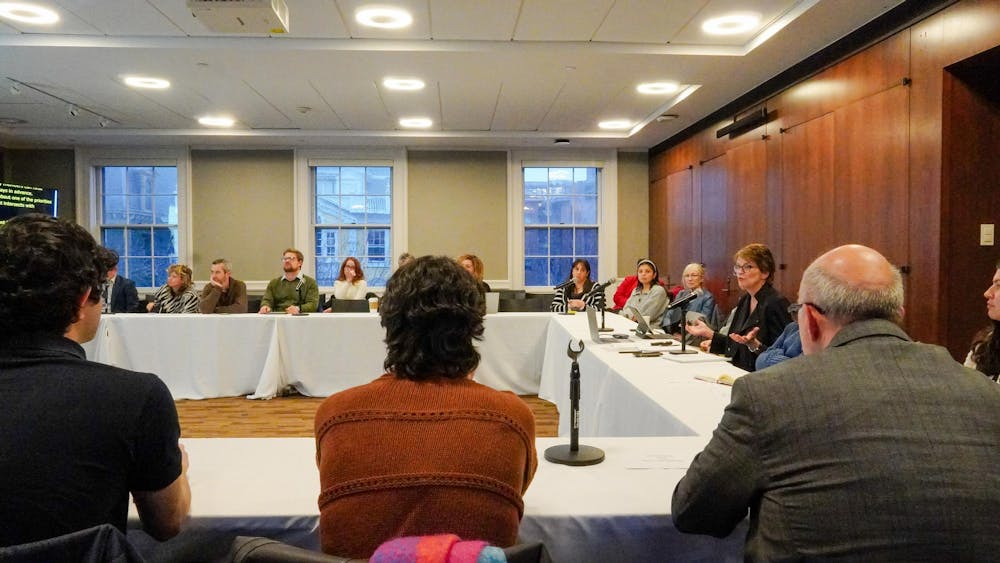The Brown University Community Council — composed of students, alumni, faculty, staff and University administration — convened for their last fall meeting to discuss the University’s artificial intelligence initiatives on Wednesday.
Provost Francis Doyle outlined Brown’s approach to AI as “knowing, enhancing, protecting and creating.” Michael Littman, a professor of computer science, was recently named the inaugural Associate Provost for Artificial Intelligence, The Herald previously reported.
“We are focused on four key problem spaces that weave together different transdisciplinary efforts already underway at Brown, and where Brown has unique strengths to address complex issues of enormous societal relevance and concern,” Doyle said.
Doyle added that there is a “tremendous momentum” at the University, with more than 70 faculty pursuing AI-related grants over the last five years.
He said that existing efforts to incorporate AI into Brown’s curriculum include establishing AI in the master’s and doctoral programs under the Division of Biology and Medicine, offering AI certificates and launching an online program in “AI governance and ethics.”
Doyle also introduced the idea of an AI sandbox — “a way of building a firewall” where there is a safe environment for data entered into AI systems.
The University is negotiating with “a couple of big companies” to “set up a prototype,” which will enable Brown to “have control of our data and a secure handling of information,” Doyle said. This will allow professors to build sandboxes around their teaching material, consolidating specially designed AIs for the course’s topic, he added.
Regarding the use of AI in classroom settings, Doyle said that “it’s at the discretion of the instructors on how to best use AI.”
He also mentioned “Conversations on AI and our Data-Driven Society,” a lecture series hosted by the Office of the Provost and the Data Science Institute, where instructors learned “the capabilities of these (AI) tools.”
During one lecture, he took a poll of the various subject areas represented by the faculty in his audience, which spanned the humanities, life sciences and engineering. “It was almost equally divided,” Doyle said.
Looking ahead, Doyle aims to take an approach that transcends academic disciplines and utilizes Brown’s “remarkable collection of experts” in various fields. “We don’t need to learn how to cross those boundaries,” he said. “It’s in our DNA.”
In the Q&A session with council members, the discussion moved to the issue of implementing guidelines for students using AI in coursework. Multiple members raised concerns regarding the inconsistent definitions of appropriate AI use across courses, suggesting the need for more uniform guidance from the University.
“The burden falls on TAs and professors to decide what is cheating and what is a code violation,” said Council member Cal Manuzza ’23 MA’24, who currently works at the School of Public Health.
Council member Ainsley LeSure, an assistant professor of political science and Africana studies, acknowledged that professors should be given room to decide their policies, but noted that although “professors have authority, they are not operating in a vacuum.” Different professors may have different policies, LeSure said.
Doyle agreed and reiterated that the University is committed to embedding the feedback “in the teaching mission in a way that is equitable, that is fair and that is appropriate for knowledge acquisition.”
Also at the meeting, President Christina Paxson P’19 P’MD’20 provided updates on other campus initiatives.
She celebrated the “skyrocketing” growth of users on BrownConnect+, an alumni networking and mentoring platform launched this fall.
She also summarized the opening of new campus spaces — a renovated Andrews House for the Cogut Institute for the Humanities and the expanded Office of Military-Affiliated Students located in Alumnae Hall. She also introduced a series of admissions initiatives aimed at fostering diversity in recruitment, a key issue after the decrease in racial diversity in the class of 2028.
Elena Jiang is a University News Editor from Shanghai, China concentrating in English Nonfiction and International & Public Affairs.





